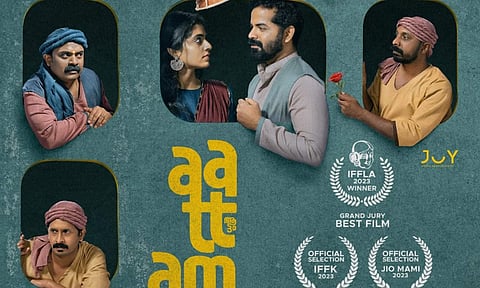Aattam Movie Review: 12 angry men navigate a first-rate script
Rating:(4 / 5)
You know a writer or director has put in a lot of work when, after watching the film, you have a vivid recollection of each character’s personality. Anand Ekarshi’s Aattam, screened at Mumbai Film Festival, is a perfect testament to the fact that the right casting alleviates most of your worries—how it contributes to a film’s quality to a large extent. No matter how brilliant your script is, if you don’t find the right people, all that hard work that went into the writing goes down the drain. And in a dialogue-heavy narrative with people talking throughout its runtime, this aspect is crucial. In this regard, Aattam succeeds in the same way that most acclaimed films in this category do. Most recently, we had 1001 Nunakal in Malayalam (streaming on SonyLIV), and Aattam is just another supreme example of new extraordinary talents announcing their arrival.
Director: Anand Ekarshi
Cast: Vinay Forrt, Kalabhavon Shajohn, Zarin Shihab
Aattam (The Play) begins with the enactment of a mythological play in which we try to find parallels to the film’s principal events. The film achieves the task of character establishment through brief moments that convey enough information to establish each individual who happens to be a theatre actor. But how often are first impressions reliable? In Aattam, character details are a constantly evolving process. For a multi-layered screenplay such as this, which maintains a degree of unpredictability throughout, it’s ideal to have a predominantly fresh cast since the presence of mainstream faces runs the risk of preconceived notions owing to the kind of roles with which the latter is often associated.
In Aattam, casting two well-known faces, Vinay Forrt and Kalabhavan Shajohn, and keeping the remaining cast members unknown make more sense as the film inches towards its finale. Vinay’s versatility and extraordinary ability to play characters that tread the line between black and white are well-known. The casting of Kalabhavan Shajohn, often associated with shady characters, is essential for sowing the seeds of suspicion in the viewer’s mind.
One can attribute the proximity of the film’s setting replete with theatre and theatre artists to the background of director Anand Ekarshi and his long-lasting association with Vinay Forrt, who has considerable experience working in plays. I also assume Anand’s post-graduate studies in psychology helped while writing this exceptionally multi-layered script. By having the narrative swirl around a case of sexual misconduct afflicting this theatre group, which features only one female character, Anand addresses a multitude of factors plaguing society’s collective mindset, beginning with the knee-jerk reaction triggered at the first appearance of an unpleasant scandal.
It wouldn’t be a stretch to call Aattam Malayalam cinema’s answer to Sidney Lumet’s 12 Angry Men. Like the 1957 classic that spawned many stimulating debates, it is a thoughtful examination of one’s internal biases and external circumstances standing in the way of truth-seeking. One also finds influences of Iranian filmmakers such as Asghar Farhadi, whose films, too, have each character representing the most common thought processes coloured by racial/class discrimination, financial troubles, relationship angst, and inferiority complex, among other things.
The screenplay of Aattam does a fantastic job of toying with our expectations as to the identity of the culprit—is it who we think it is, or is it someone else? Is the survivor telling the truth? Why did she take so long? What’s her connection to the person she confessed the incident to? Does the latter, also a man, really care about it? Does he have anything to gain from it? Is his behaviour dictated by a previous incident that bothered him? These are just a few of the truckload of thought-provoking questions—all pertinent in the light of many recent events of similar nature—that the film brings up.
It also paints a picture of the plight of unemployed theatre actors, who live on their significant other’s income or depend on daily wages. What would we do if we were in their shoes? In judging them, the film is also judging us. How would a man burdened by day-to-day troubles, decades-long conditioning, and insecurities assess the situation? Would he have the necessary patience or time to ponder a case from every angle, even though he possesses the rigorous discipline required of an actor? For example, how would he evaluate the character of a woman who drinks? Aattam poses such questions most subtly by creating apt situations that fit organically with each plot development.
The filmmaking is also impressive with regard to having our attention in a vice-like grip. The repetition fatigue is avoided by having the characters either briefly switch locations or take short breaks—a quality found in 12 Angry Men, too. But these are not just filler material; they are also opportunities to give us a context as to why someone behaved in a certain way or what influenced a problematic statement they made in a discussion earlier.
The simultaneous interactions between two groups of individuals, for instance, ensure our unwavering attention. We want to participate because we are eager to see what happens next. There is one trying situation where the film assumes the nature of a suspense drama, just like that Mr Wolf moment in Pulp Fiction where characters have to make themselves ‘invisible’ in a few minutes.
It’s also admirable that the film doesn’t exhibit an over-reliance on music to inform the mood of a scene, except for rare instances to build up a sense of anxiety. Also ensuring our undivided attention is Anurudh Aneesh’s unvarnished framing choices that work in tandem with Mahesh Bhuvanend’s tight editing work.
Aattam is, simply put, a film that doesn’t suffer from too much direction. If Sidney Lumet were alive today and saw this film, I’m sure he would’ve approved.

